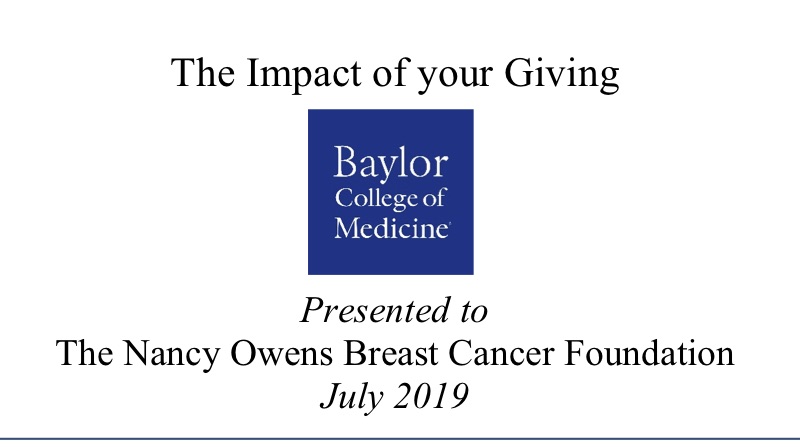
The Nancy Owens Breast Cancer Foundation’s partnership with Baylor College of Medicine has furthered key research into breast cancer to improve patient health outcomes. Through the Foundation’s generosity, George Miles, M.D., Ph.D., Director of the Pathology Core and Lab in the Lester and Sue Smith Breast Center, continued to work on a circulating tumor DNA (ctDNA) clinical workflow for rapid monitoring of breast cancer and response to therapy. These assays are liquid biopsies that use less invasive, highly sensitive technologies to identify clinically actionable mutations in a patient and to study variations in gene sequences. The Foundation also funded Dr. Miles’s laboratory buildout and the installation of a digital droplet polymerase chain reaction device, which are essential components of this research.
Dr. Miles’ preliminary work on ctDNA assays, funded by the Foundation,was featured in Baylor’s Specialized Programs of Research Excellence (SPORE) grant application on metastatic breast cancer. The project received a competitive, fundable score from the National Cancer Institute (NCI), which means Dr. Miles’s project is now pending federal budget. This is a major step in obtaining additional funding from the NCI, which created SPORE grants to expedite the translation of promising research into new treatments.
For future grant applications, Dr. Miles is designing a protocol to improve quality of life, reduce toxicity from ineffective drugs, increase cost effectiveness for metastatic breast cancer management and expand clinical trial opportunities. Specialized sample preparation equipment for this liquid biopsy-based approach will soon arrive at his lab to automate and standardize these research methods. The Foundation’s contribution spurred the development of significant preliminary data to move this project toward a formal clinical validation study, followed by phased trials that will compare the predictive value of serial liquid biopsies in monitoring disease burden in breast cancer. Ultimately, it is the goal of these studies to refine patient management and offer a substantial lead time over disease progression, inform adaptive treatment designs to minimize the time patients are exposed to unnecessary toxicities or ineffective therapies and improve clinical trial eligibility and enrollment for patients.
George Miles, M.D., Ph.D., F.C.A.P.
Dr. George Miles is Assistant Professor in the Department of Molecular and Human Genetics at Baylor College of Medicine. His expertise and research interests include cancer genomics, molecular diagnostic assay development, enhancing high-throughput molecular diagnostic technologies to address functional genomics and single molecule counting. Prior to joining Baylor in 2016, he served as a molecular pathologist and clinical genomicist for Molecular Health, GmbH, a data- and analytics-driven precision medicine company.
Dr. Miles developed an approach to massively parallel protein detection in breast cancer tissue using next-generation sequencing platforms. This approach has fundamental applications for cost-effective, high-throughput analyses of proteins relevant to precision medicine and translational research. He also works with multidisciplinary teams to direct targeted therapy and relevant clinical trial assignments tailored to a patient’s cancer genomic information.
Dr. Miles received his medical and doctoral degrees from Texas A&M University. He completed his residency training in anatomic pathology at the National Cancer Institute, followed by a residency at the National Institutes of Health (NIH), where he was chief resident of the Laboratory of Pathology. He went on to complete a research fellowship at the NIH and a clinical fellowship in molecular genetic pathology at Washington University School of Medicine in St. Louis, Missouri, where he subsequently served as an instructor in the Department of Pathology and Immunology.
Matthew Ellis, M.D., Ph.D.
Dr. Matthew Ellis directs the Lester and Sue Smith Breast Center at Baylor College of Medicine. He is a world-renowned clinician and researcher of the molecular profiling of breast cancer.
Dr. Ellis earned his medical degree from the University of Cambridge in England, postgraduate clinical training at the Royal College of Physicians in London and Ph.D. training at the Royal Postgraduate Medical School at the University of London.
Prior to Baylor, Dr. Ellis served as Professor of Medicine, Head of Breast Oncology and Head of Medical Oncology at Washington University School of Medicine. Prior to Washington University, he served on the faculty at Duke University and Georgetown University.
His research unveiled groundbreaking information about mutations in breast cancer and their clinical relevance. He has been instrumental in developing a Genome Atlas and Therapeutic Road Map for estrogen receptor positive breast cancer. Most recently, he found that metastatic breast tumors initially positive for the estrogen receptor frequently harbor mutations and translocations in the receptor that render the tumor resistant to endocrine therapies used to block estrogen.
